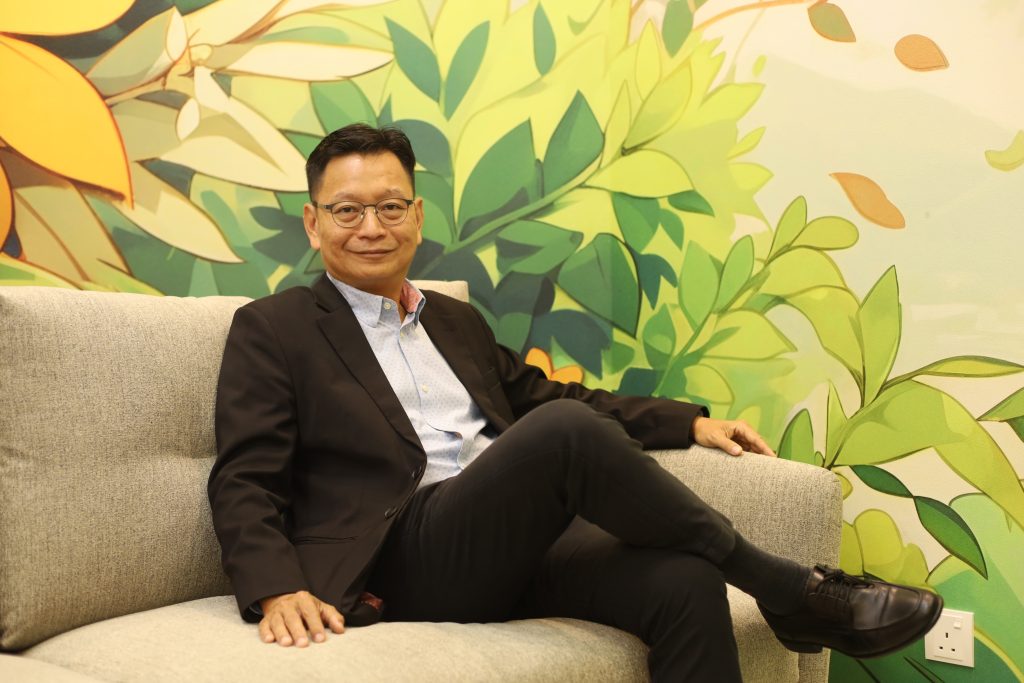
Over the last one year, REDtone Digital Bhd’s share price has almost doubled as the market flocked to the counter that counts His Majesty Sultan Ibrahim, King of Malaysia, as its second-largest shareholder.
While the 92.45% share price rally over one year is already an amazing feat for its shareholders, group CEO Lau Bik Soon is confident of further growth.
“I’m sure that in the next five years, we will continue to grow and, hopefully, we will be a billion-ringgit company,” says Lau when met at the group’s headquarters in IOI Business Park in Puchong.
REDtone had also caught the market’s attention after it secured a RM398.1 million contract to provide a unified communications system for civil servants called MyGovUC3.0. The contract is spread over 60 months.
“It is not the biggest contract that we have ever secured. In the past, REDtone has secured larger projects, especially related to USP (universal service provider), where we build mobile infrastructure in rural areas.
“REDtone has secured multiple USP projects, and these are actually large-scale projects where we deploy multiple mobile infrastructure, provide connectivity, sensing and things like that,” Lau tells The Edge in an interview.
He adds that REDtone had previously secured USP contracts ranging from around RM100 million to more than RM500 million. Some of these projects were awarded under the National Digital Network (Jendela) programme.
The MyGovUC3.0 contract is still sizeable, and one that would provide a boost to the group’s revenue over the next five years. If the contract is spread evenly over the five-year period, it can be assumed that REDtone will receive a yearly revenue of RM79.62 million, which is about 37% of the RM217.83 million revenue booked for the financial year ended June 30, 2023.
It remains to be seen how much REDtone would make from the contract, with as much as RM294.27 million going towards paying Awantec Systems Sdn Bhd, a subsidiary of AwanBiru Technology Bhd.
On Feb 12, 2024, Awantec entered into a service agreement with REDtone Engineering & Network Services Sdn Bhd. Pursuant to the agreement, Awantec is responsible for providing cloud computing solutions and services for the MyGovUC3.0 project. Those solutions and services include products such as Google Workspace Enterprise and Google Cloud Platform. Awantec is the managed service provider for Google Cloud suites for the public sector in Malaysia.
Over the past year, as much as RM1.3 billion worth of government digitalisation contracts have been awarded by various ministries and agencies. The biggest of these was the MyGovUC3.0 contract.
Critics alluded to REDtone’s prominent shareholder line-up giving it a boost. The Berjaya Group has a 40.79% stake while the King has 17.34% of the outstanding shares in REDtone, according to the group’s 2023 Annual Report. Pertubuhan Keselamatan Sosial (Socso), Kumpulan Wang Amanah Negara and Petroliam Nasional Bhd (Petronas) are also REDtone shareholders.
On this, Lau-who has been the group’s CEO since July 8, 2011 – says REDtone’s ability to adapt to market changes to expand its businesses is pivotal to its success. Since its founding 23 years ago, Lau says, REDtone has been pivoting to survive and grow. “We have been pivoting and that’s been our DNA. So, I believe we have the strength to adapt to market changes and transform ourselves to stay relevant.”
He recalls that when the market switched from calls to voice over internet protocol or VOIP, REDtone – which started off as a discounted call provider offering cheap minutes and calling cards-had pivoted towards the data business.
“Instead of waiting for the industry (to set), we decided to venture into the data business and started off by acquiring a small data company. I still remember it had probably fewer than 20 customers. Then we retrained all our people and transformed the whole organisation. We started the connectivity business, and after that, the managed services business. So, we continue to add on and adapt, which has helped to propel us forward,” says Lau.
We have been pivoting and that’s been our DNA. So, I believe we have the strength to adapt to market changes and transform ourselves to stay relevant.” – Lau
Going regional with Smart Agriculture
While REDtone will continue to grow its tele- communications and managed telco network services locally, the group is growing its Internet of Things (IoT) and cloud businesses both locally and regionally in Southeast Asia and the Indian subcontinent.
Using IoT, REDtone has developed a smart farming business that uses sensors and data analytics to help farmers increase their yield and reduce their dependence on manpower, as well as manage costs.
“If you talk about potential, we are not only limited to the Malaysian market, as we have intellectual property, especially for our smart farming, IoT solutions, and some of the expertise that we have in cloud and connectivity, so we are going regional,” says Lau.
He says REDtone has already appointed partners in the region to market and deploy its smart farming IoT and Cloud-based solutions.
Lau concedes that the group will need to work closely with larger organisations and companies as well as government agencies, such as Malaysia Digital Economy Corporation and the Department of Agriculture, to spread awareness of smart farming.
REDtone is also an authorised reseller of US billionaire tech CEO Elon Musk’s Starlink in Malaysia. With its cloud computing ability, REDtone is able to provide Starlink as a service to companies to deploy in managing their assets, such as plantation companies.
With Starlink, plantations that are in remote areas can be connected to the cloud. Coupled with IoT such as sensors, cameras and radio frequency applications, remote plantations can be managed digitally, says Lau.
This is on top of the managed telco network services that REDtone offers to its enterprise customers, where it builds, maintains and operates large-scale telco engineering projects, WiFi hotspots, base stations and fibre-optic infrastructure.
“If you look at these end-to-end services, they’re beyond just the tech, just the telecommunications. They mark a convergence between telecommunications and IT services, and that’s where our key differentiation is today,” he says.
Source: The Edge











